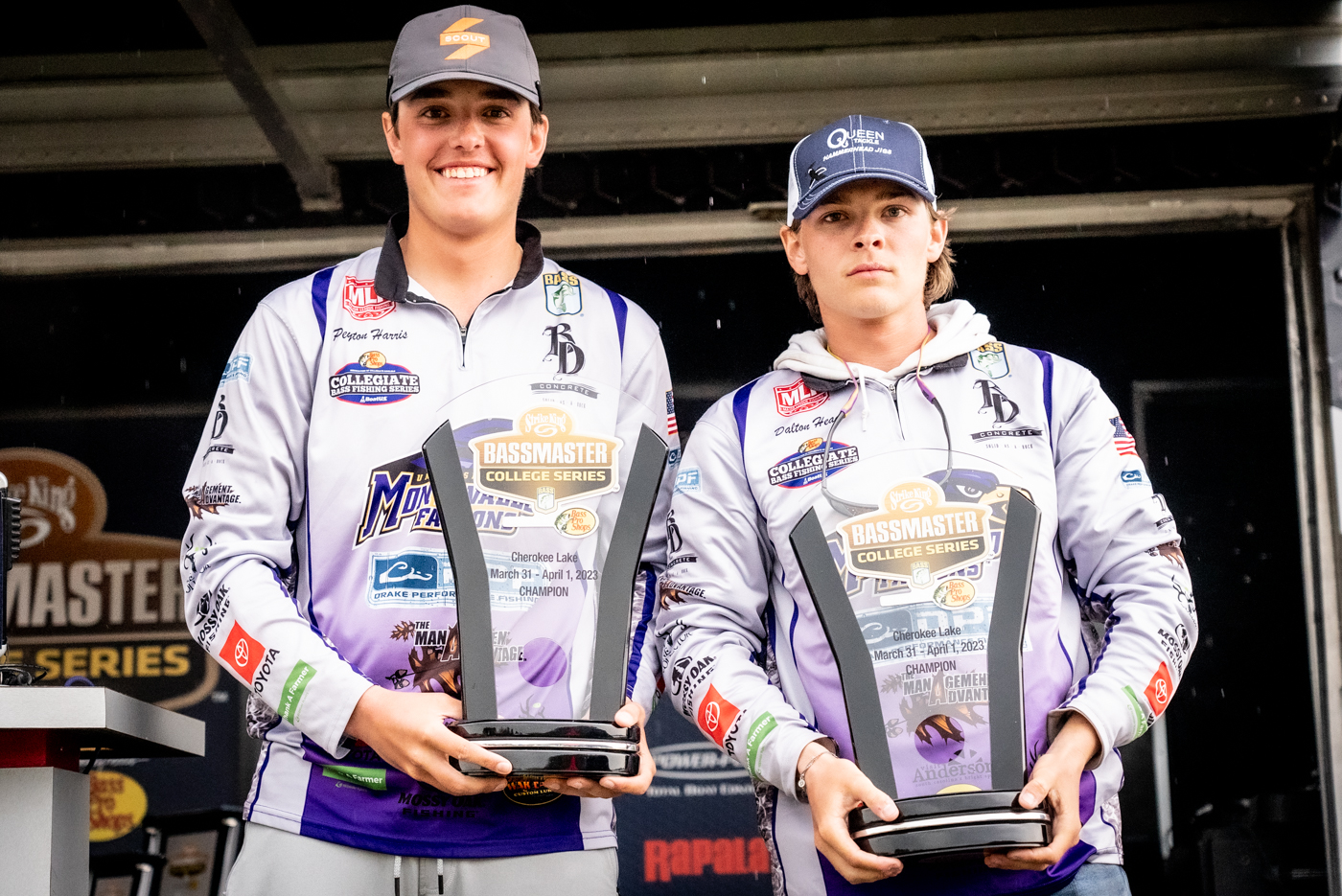
JEFFERSON COUNTY, Tenn. — Playing a smart game, Peyton Harris and Dalton Head of the University of Montevallo enjoyed a fast start that led to a winning total of 17 pounds, 4 ounces at the Strike King Bassmaster College Series at Cherokee Lake presented by Bass Pro Shops.
In a tight race where 1-12 separated first place from 10th, Harris and Head edged Missouri State University’s Aric Szambelan and Tyler Flacke by 3 ounces. The top 27 teams advanced to the Strike King Bassmaster College National Championship presented by Bass Pro Shops.
“Putting in the work paid off,” Harris said. “We were out there from daylight until dark every day of practice. We knew that putting in that extra work would pay off sooner or later.
“We made every fish count, never gave up and fished until the last minute.”
The sophomore winners committed their day to one stretch of mid-lake bank about 10 miles from takeoff where they targeted long points with big boulders.
“It was tough in practice. I could generate some bites and some of them were 3-pounders, but I only had one or two 4-pound bites,” Head explained. “We looked at the lake and decided that the area we fished had the most (habitat) that matched the pattern I was running.
“It was those isolated boulders and places where bait gets early in the morning, so those smallmouth were feeding up. It just made a lot of sense to be in that area. It seemed like that’s where the fish were congregated.”
Dialing in the contour lines where they found the most boulders, Harris and Head were able to pinpoint their casts and secure a quick limit.
“This morning, the first 20 minutes were unreal,” Head stated. “We had a little over 14 pounds by 9. We were getting two or three bites off every little rock.
“We noticed there were alewives in the area that stayed because of the cloudy and rainy conditions. They didn’t go out deep. It rained off and on until about 10, but it was cloudy all day.”
Harris and Head caught their winning bass on a Berkley Stunna Jerkbait 112+ and a Megabass Vision OneTen.
While others struggled with proximity, the winners fared best by making long casts to stay off their bass. This strategy allowed them to tempt the wary smallmouth.
Szambelan and Flacke finished second with 17-1. Also fishing the mid-lake region, they hunkered down in a large creek and targeted rock piles in 15 to 20 feet.
“They were all kinda staging up,” Szambelan said. “When I could find them on Garmin LiveScope, they’d flurry. Our first fish was probably 9 o’clockand we had our limit by 10:30.
“After that, it got tough and it was hard to get bit. We made our last cull at 3:30.”
Szambelan fished a Damiki rig comprising a 1/4-ounce Queen Tackle Tungsten Live Sonar Head and a Z-man Scented Jerk ShadZ. Also called “moping” by northern anglers, like Canadian Jeff Gustafson who won last week’s Academy Sports + Outdoors Bassmaster Classic presented by Toyotawith the technique, Damiki rigging relies on a perfectly vertical presentation to fish that have been spotted on live sonar.
“It was just getting over them and they would fire up right away,” Szambelan said.
Flacke caught key fish on a drop shot with a 2.8 Keitech FAT Swing Impact swimbait. He also fished this bait on a 1/4-ounce ball-head jig.
Carty Shoen and Bennett Slinkard of Auburn University took third place with 16-11. Targeting classic prespawn staging areas, they leveraged the day’s weather to maximize their bites.
“We targeted sheer rock off channel swings and looked for transition points where it goes from really steep to shallow, or from sedimentary rock to boulders,” Shoen said. “The fish were sitting on those transitions and we caught them mostly in 5 feet.
“We had our limit by 8:30 and we had our weight by 10:30. The rain and that front was the whole ticket for us. That opened up a window for a reaction bite and we capitalized on it to get it done.”
Shoen and Slinkard caught their fish on squarebill crankbaits. Most productive was the Strike King 1.5.
Jonathan Fraley and Jonathan Fitch of Kentucky Christian University won the Big Bass award with their 6-8.
Originally scheduled as a two-day event, the tournament was shortened to one day when B.A.S.S. officials canceled Saturday’s round due to predicted high winds that are expected to make conditions unsafe for boating and related tournament activities.
The National Weather Service (NWS) has issued a wind advisory through Saturday evening calling for southwest winds at 25 to 40 mph with gusts up to 70 mph. Damage and widespread power outages are expected.
“The safety of our competitors is always our top priority,” said Glenn Cale, B.A.S.S. tournament manager of the College Series. “We took a close look at the weather forecast and determined that the conditions would be unsafe.”
The Jefferson County Department of Tourism hosted the tournament.




